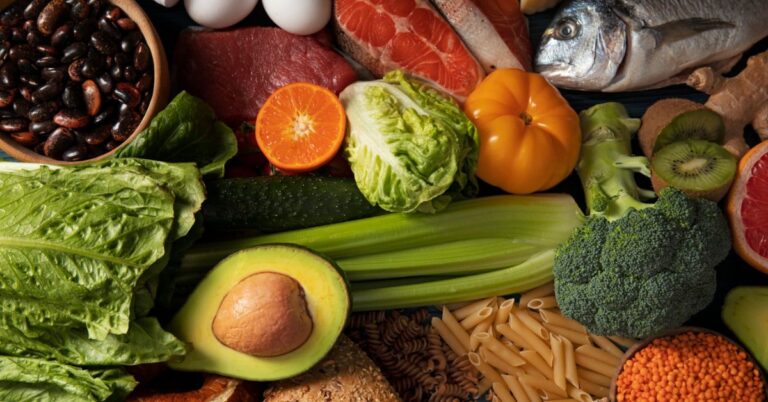In today’s fast-paced world, maintaining a balanced diet can seem like a daunting task. However, understanding the essential nutrients your body needs daily is the first step towards achieving optimal health and well-being. This comprehensive guide will walk you through the key components of a balanced diet, helping you make informed choices about what to eat each day.
Introduction
A balanced diet is the cornerstone of good health. It provides your body with the necessary nutrients to function properly, maintain a healthy weight, and reduce the risk of chronic diseases. Essential nutrients are compounds that our bodies cannot produce in sufficient quantities on their own, so we must obtain them from our diet. These nutrients are broadly categorized into macronutrients and micronutrients, each playing a crucial role in our overall health.
Macronutrients
Macronutrients are the nutrients we need in large quantities to provide energy and support bodily functions. They include carbohydrates, proteins, and fats.
Carbohydrates
Carbohydrates are the body’s primary source of energy. They are essential for brain function, physical activity, and the proper functioning of organs. The recommended daily intake of carbohydrates is 45-65% of your total daily calories.
Good sources of carbohydrates include:
- Whole grains (brown rice, quinoa, oats)
- Fruits (apples, bananas, berries)
- Vegetables (sweet potatoes, broccoli, carrots)
- Legumes (beans, lentils, chickpeas)
It’s important to focus on complex carbohydrates, which are rich in fiber and nutrients, rather than simple carbohydrates found in processed foods and sugary snacks. Complex carbohydrates provide sustained energy and help regulate blood sugar levels.
Proteins
Proteins are the building blocks of life, essential for growth, repair, and maintenance of body tissues. They also play a crucial role in enzyme production, hormone regulation, and immune function. The recommended daily intake of protein is 10-35% of your total daily calories, or about 0.8 grams per kilogram of body weight for adults.
Excellent protein sources include:
- Lean meats (chicken, turkey, lean beef)
- Fish and seafood
- Eggs
- Dairy products (milk, yogurt, cheese)
- Legumes (beans, lentils, peas)
- Nuts and seeds
- Soy products (tofu, tempeh)
For vegetarians and vegans, combining different plant-based protein sources can ensure you get all the essential amino acids your body needs.
Fats
Despite their bad reputation, fats are crucial for hormone production, vitamin absorption, and cell membrane integrity. The key is to choose the right types of fats and consume them in moderation. The recommended daily intake of fats is 20-35% of your total daily calories.
There are three main types of fats:
- Saturated fats: Found in animal products and some tropical oils, these should be limited in your diet.
- Unsaturated fats: These include monounsaturated and polyunsaturated fats, which are considered healthier options.
- Trans fats: Artificial trans fats should be avoided as they can increase the risk of heart disease.
Good sources of healthy fats include:
- Avocados
- Nuts and seeds
- Olive oil
- Fatty fish (salmon, mackerel, sardines)
- Chia seeds and flaxseeds
Micronutrients
Micronutrients are required in smaller quantities but are no less important for maintaining good health. They include vitamins and minerals.
Vitamins
Vitamins are organic compounds essential for various bodily functions. Here are some key vitamins and their food sources:
- Vitamin A: Crucial for vision, immune function, and skin health. Sources include sweet potatoes, carrots, spinach, and eggs.
- Vitamin C: Important for immune function and as an antioxidant. Found in citrus fruits, berries, bell peppers, and broccoli.
- Vitamin D: Essential for bone health and immune function. Sources include fatty fish, egg yolks, and fortified foods. Sunlight exposure also helps the body produce vitamin D.
- Vitamin E: An antioxidant that protects cells from damage. Found in nuts, seeds, and vegetable oils.
- Vitamin K: Important for blood clotting and bone health. Sources include leafy green vegetables and some fermented foods.
- B-complex vitamins: These include thiamin, riboflavin, niacin, B6, B12, and folate. They are crucial for energy metabolism and nervous system function. Sources include whole grains, lean meats, eggs, and leafy greens.
Minerals
Minerals are inorganic elements that play various roles in the body. Some essential minerals include:
- Iron: Crucial for oxygen transport in the blood. Sources include red meat, spinach, and legumes.
- Calcium: Essential for bone health and muscle function. Found in dairy products, leafy greens, and fortified foods.
- Magnesium: Important for muscle and nerve function, and bone health. Sources include nuts, seeds, whole grains, and leafy greens.
- Zinc: Crucial for immune function and wound healing. Found in oysters, beef, pumpkin seeds, and lentils.
- Potassium: Important for heart function and blood pressure regulation. Sources include bananas, potatoes, and yogurt.
- Selenium: An antioxidant important for thyroid function. Found in Brazil nuts, seafood, and whole grains.
Fiber
Fiber, while technically a carbohydrate, deserves special mention due to its numerous health benefits. It aids in digestion, helps maintain a healthy weight, and can lower the risk of diabetes and heart disease. The recommended daily intake is 25-30 grams for adults.
Good sources of fiber include:
- Whole grains
- Fruits and vegetables (especially with the skin on)
- Legumes
- Nuts and seeds
Water
While not a nutrient per se, water is essential for life and proper bodily functions. It helps regulate body temperature, transport nutrients, and remove waste products. The general recommendation is to drink at least 8 glasses (64 ounces) of water per day, but individual needs may vary based on activity level, climate, and overall health.
Sample Balanced Daily Menu
Here’s an example of how you might structure your meals to include a balance of all the nutrients discussed:
Breakfast:
- Whole grain toast with avocado and poached eggs
- A small orange
- Green tea
Lunch:
- Grilled chicken salad with mixed greens, cherry tomatoes, and olive oil dressing
- Quinoa
- A small apple
Dinner:
- Baked salmon
- Roasted sweet potato
- Steamed broccoli
- Brown rice
Snacks:
- Greek yogurt with berries and a sprinkle of nuts
- Carrot sticks with hummus
Tips for Maintaining a Balanced Diet
- Practice portion control: Use smaller plates and be mindful of serving sizes.
- Plan your meals: Prepare meals in advance to ensure a good balance of nutrients throughout the week.
- Read nutrition labels: Understanding what’s in your food can help you make better choices.
- Cook at home more often: This gives you control over ingredients and cooking methods.
- Eat a variety of foods: Different foods provide different nutrients, so aim for diversity in your diet.
- Listen to your body: Pay attention to hunger and fullness cues.
- Stay hydrated: Keep a water bottle handy and drink water throughout the day.
- Limit processed foods: Focus on whole, nutrient-dense foods instead.
Conclusion
Achieving a balanced diet doesn’t mean striving for perfection or completely eliminating foods you enjoy. It’s about making informed choices most of the time and understanding the role different nutrients play in your overall health. By incorporating a variety of nutrient-rich foods into your daily meals and being mindful of your eating habits, you can nourish your body effectively and set the foundation for long-term health and well-being.
Remember, individual nutritional needs can vary based on factors such as age, sex, activity level, and overall health. If you have specific health concerns or dietary requirements, it’s always best to consult with a registered dietitian or healthcare provider for personalized advice. With knowledge and mindful choices, you can enjoy a balanced, nutritious diet that supports your health and vitality.




